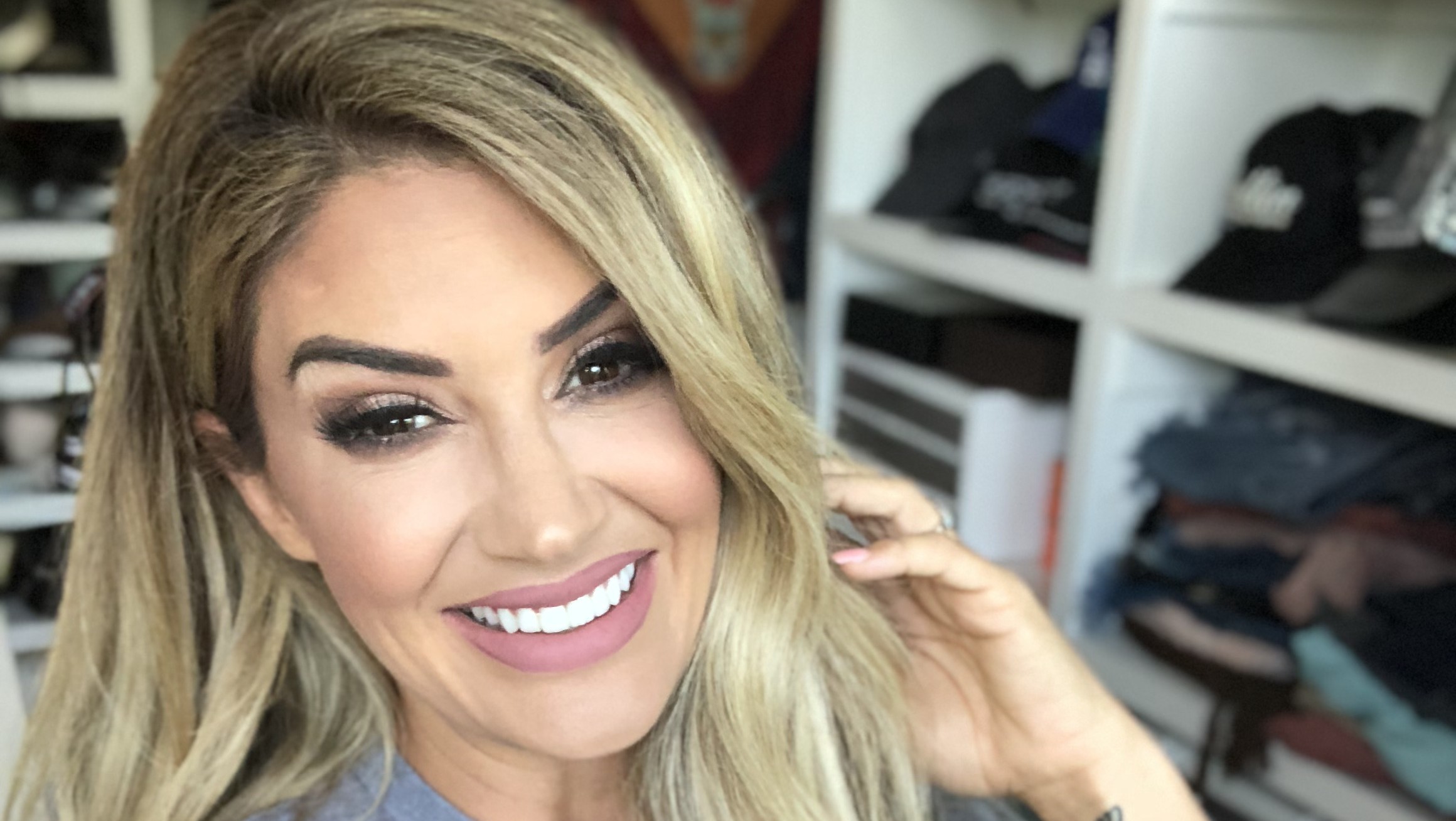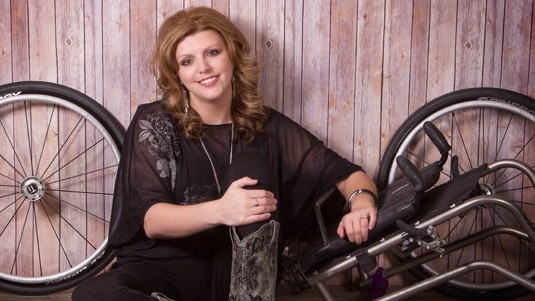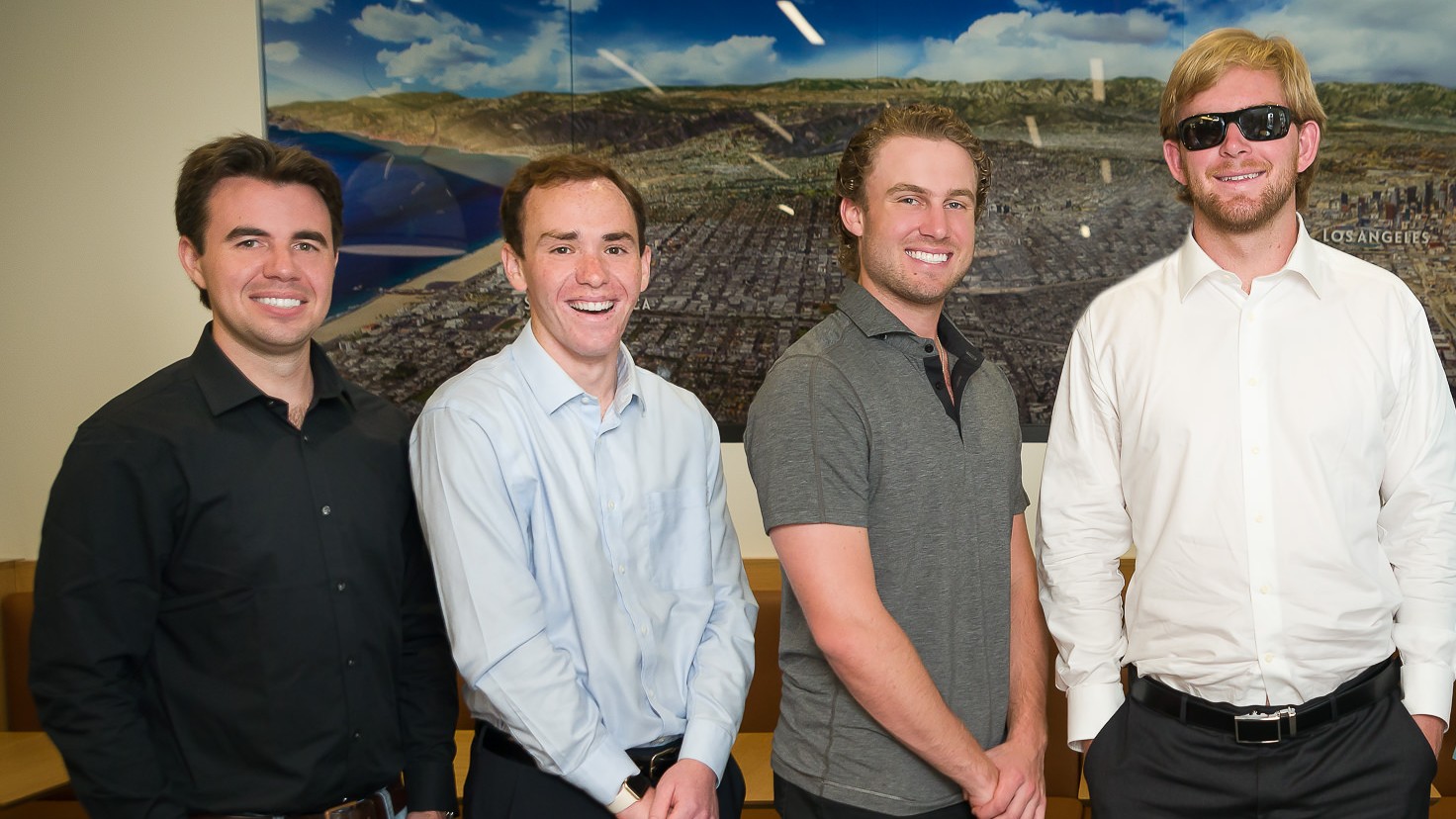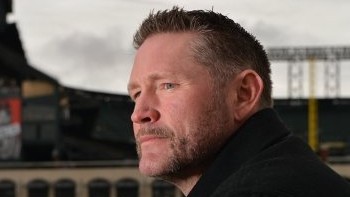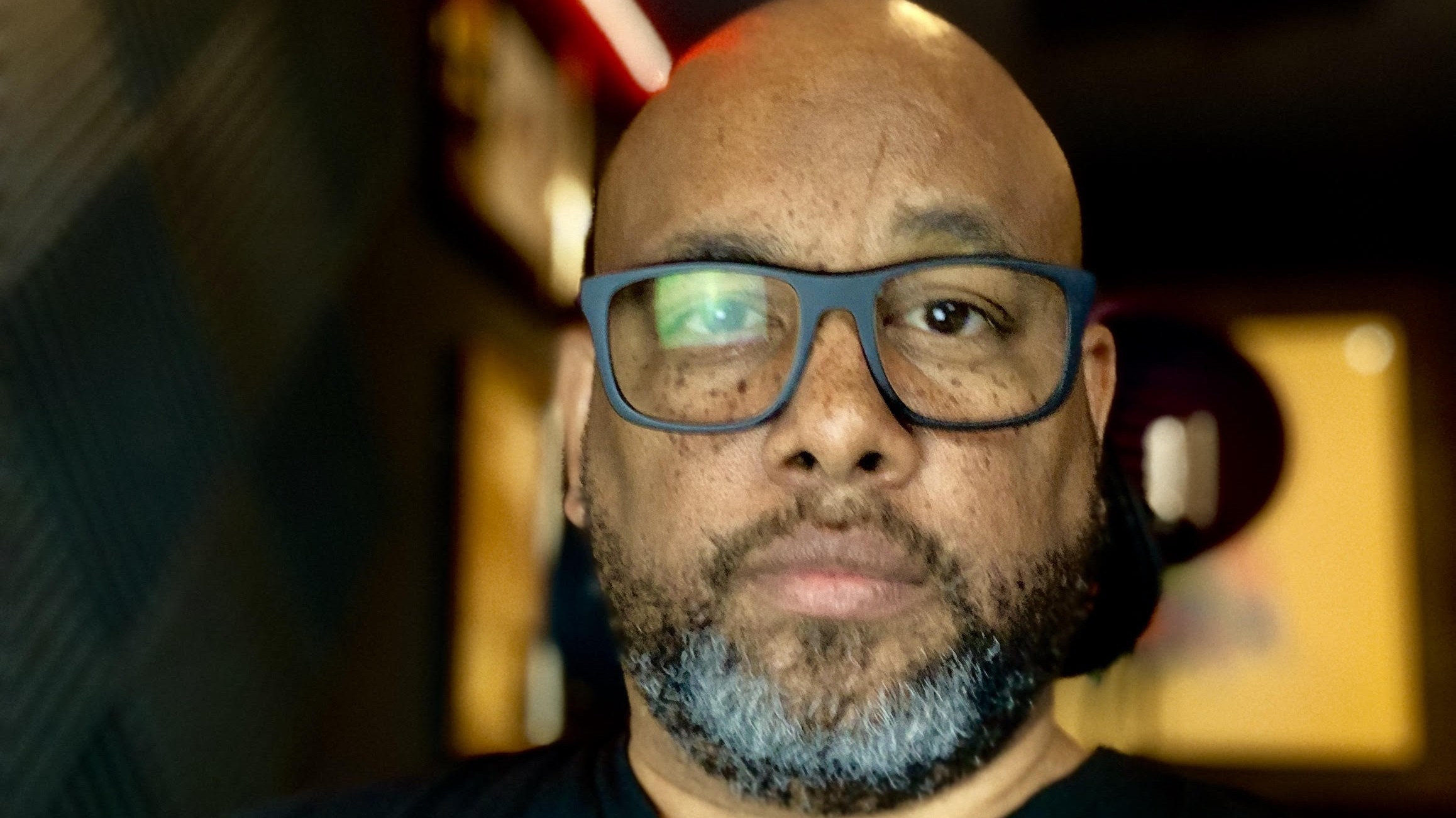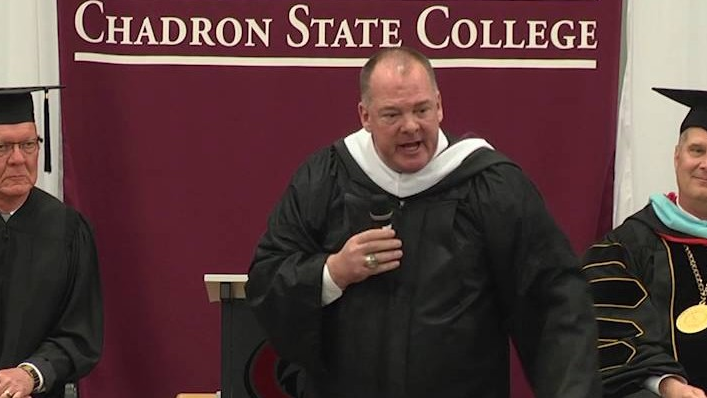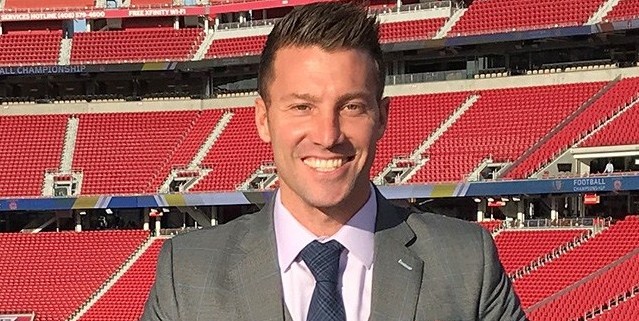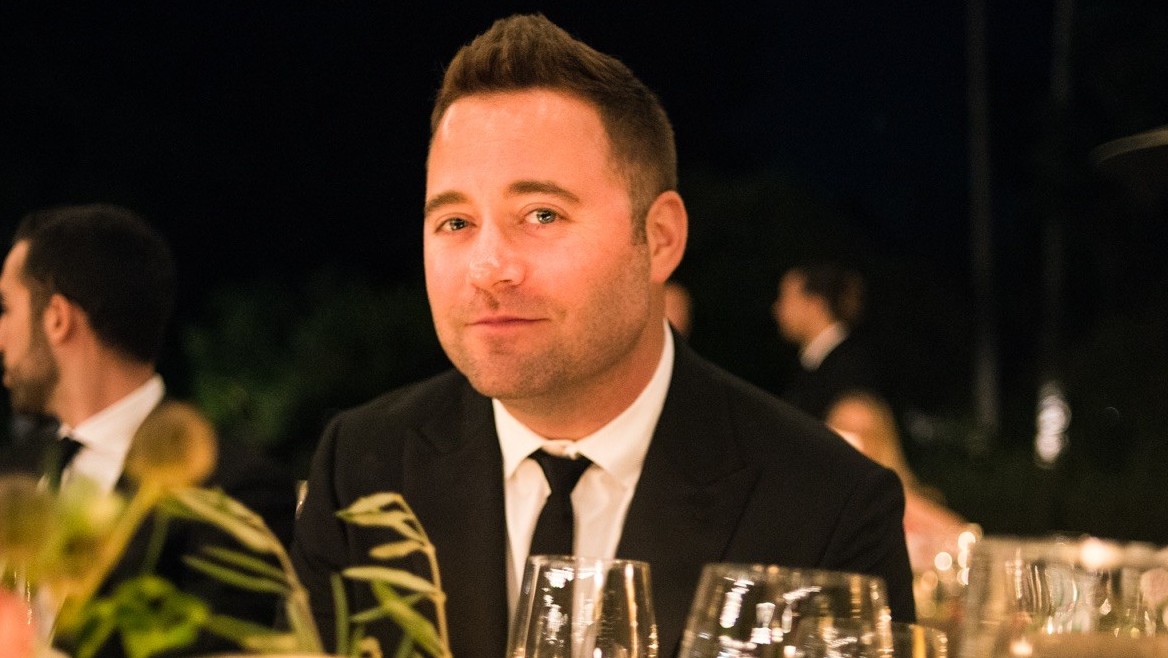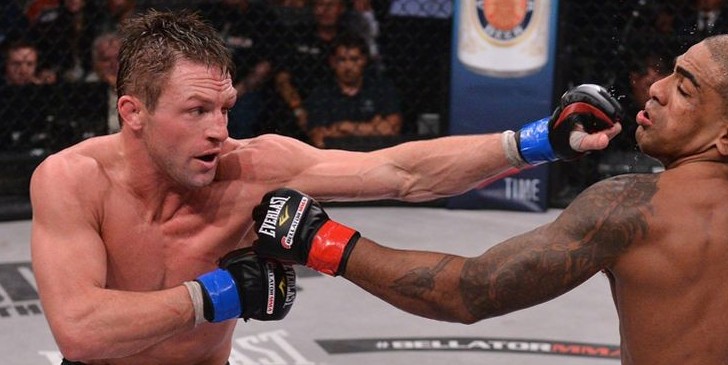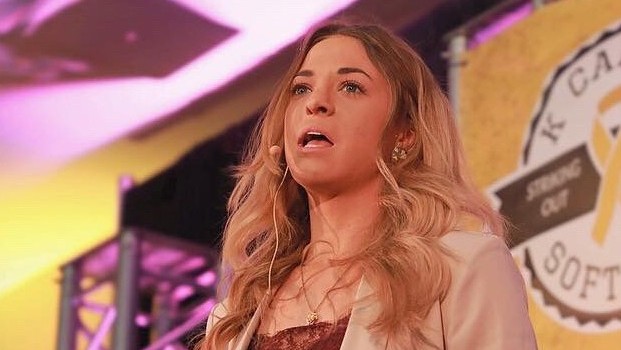
Episode 14 - Kendall Burton
- By Brendan Egan
- May 29, 2019
In episode 14 of Let's Engage, Jake and Brendan engage with Kendall Burton. Kendall Burton's story is nothing short of compelling. Being born with a cleft/lip & palate she went through 23 surgeries by the time she was 17. At age 18, she survived an acute ischemic stroke as a freshman in her first semester in college. As a determined young woman, she fought her way back onto the field. After transferring schools three times, she found her forever home at the University of Georgia which led her to achieve her dream of playing at the Women's College World Series. Kendall Burton is on a mission to impact lives with her story of resilience by sharing the most vulnerable and victorious times she has experienced.
Listen along with Kendall and for more information or to book her for a speaking engagement or experience, visit her profile on Engage.
--
Transcription:
Jake Olson: Well, thank you for joining us for another edition of Let's Engage. I am your host Jake Olson, alongside my cohost Brendan Egan. We got our producer and somewhat of a technician, Daniel Hennes, uh, here with us. We appreciate you joining us today. We want to bring you a really, really cool, interesting guest. She has inspired thousands of amongst the sports community and the world. Uh, Kendall Burton, thank you so much for joining us today. We really appreciate it.
Kendall Burton: Yeah, thank you. Great to be here.
J: Absolutely. Alright Kendall so tell us, so I read your story, a couple of different articles online and I was absolutely amazed, um, kind of myself growing up for the first really 12 years of my life in and out of hospitals all the time in and out of treatments, you know, trying to figure out what to do next. So for you, the same way you had 23 surgeries, uh, by, what was it? 16, 18,
K: 17? Yes.
J: By the age of 17. So how, how was that kind of growing up in that reality?
K: I mean, I tell this to everybody. When I was a kid, I didn't really think anything of it. You know, I was just kind of like what I was having to do and I feel like when I hit around middle school was when I kind of realized that, you know, people kind of, everyone says I want to be, you know, unique and different, but like normalcy has its perks. And that was kind of the time of when I was like, wow, I'm like, had all this done. Like I still have so much, you know, a long way to go. Because when I was like Middle School was when I was having a lot of like braces and dental work done. I only had like two huge major surgeries like left to give in high school. Uh, but I feel like it was, it was certainly taxing, but I almost feel like it was like, once you hit that kind of like, when bullies come about, like that was when it was the hardest for me.
J: Right. How much, how much did you, did you have to endure with that with like people making fun of you or bullying you and, in kind of grade school and high school?
K: No, in high school I, I didn't, I did have some bullies in high school but I didn't have, I had way more in middle school and like at the very tail end of elementary school and you know, in elementary school, I didn't really understand why because like I said now I was a kid. I was kind of like thought that like, oh like other people have this too, right? Like it was like I thought I was cool for having all these surgeries and going through all this stuff. Cause like when you're a little kid, when you do something differently, it's like extremely exciting. You know, when it got to the point of people like pointing out that I looked different and that, you know, I like, oh I have a scar on my face and like why, why is your nose look like that? Why is your lip look like that? And you know those questions, like when they initially like asked me, I didn't really think anything of it. It was kind of, I just like answered like a normal person. I was like, oh well this happened and this is what I've done and this is this. But like it was like, I feel like it got kind of like traumatic for me when I would go home and think about it and be like, oh well, like this is what everyone else sees me as. And it was kind of like, I feel like for years I had to kind of get to a point where I was really okay with how I looked and like what my story was and what I've been through and that it's okay that, you know, it took me years and years and years to have, you know, teeth that were like had no braces. I'm like, is that for a while? I like where I had missing teeth and just all this stuff. I mean, it just kind of like, like I said, it was just like a process of me being okay with who I was and what I looked like and what my story was.
J: Did you think like your friends and family obviously helped you through that? I mean for them loving, you know, like regardless, I know in the articles I read it, you know, your parents were seeing like they've carried their love for you so much.
K: Oh my gosh, absolutely. I mean my friends, it was kind of like almost got to the point where like if someone would say something about like my face in general, my friends were more mad than I was. And you're like, and along with my parents and my sister, you know, I was kind of like having that support system of like them almost being more angered by like people making negative comments towards me. It certainly helped me, not that like they even like actually would do anything about it, but it was just kinda like them being really frustrated about it kind of helped me learn that like, you know, and they were like their support just in general like help me grow into being like this is okay. You know, like I still have so many people who love me and like think I look great and like take everything into account.
J: And then you found kind of softball playing with your dad at kind of the early age. That was kind of your outlet?
K: Yeah, absolutely.
J: So kind of is, did you play any other sports or was kind of softball your first love or was it, was it just kind of being there, being able to do it with your dad was the difference or what, how did softball be kind of become your main sport?
K: No, I actually stopped. I was one of the last, like sports I did not as a kid. So I like did dance and I hated every second of it. I played basketball, I did soccer and gymnastics and like nothing is just like nothing was it. And actually my Dad and I were just walking out at Walmart one day and there is a stand to sign up for Missouri city little league like softball. And my dad, you know, he grew up, he played baseball in college and a little bit in the minors and he and I had no idea that softball was really a thing honestly. And he's like, well do you want to sign up? And then it just, from then on it was just, softball was number one. And I ended up playing volleyball in middle school. I ran track and I loved those sports, but nothing ever matched up to softball. And certainly the bond that I have with my dad just because of softball and baseball. It is truly like unmatched by anything else.
J: Absolutely. I mean, uh, it's a, it's, I know that I talk about the father son bond between baseball. I imagine it's, it's, it's just as strong with kind of that that daughter had father bond with, with softball as well. Uh, when, when, when is the first time you remember hitting a home run?
K: Oh my God. I hit my first home run so I was 15 I believe. Actually, funny story, it was on his, it was on my dad's 50th birthday. Yeah, it was awesome. Then, I like remember specifically like hitting home plate and then I was like walking back to the dugout. I was like, happy birthday Dad. It was awesome.
J: That is really cool. That's really, did you know it when you struck it or you like it was kind of like, man that feels different off the bat?
K: Oh No, absolutely. I was like running like I was a little kid. I like never really, cause I was always assuming it would never go over the fence. Like it was kind of like I kept watching, I was like, oh my gosh. I think go. I was like, oh my God. It did, it went over.
J: That is awesome. Okay. So you then you graduate high school in, you want to obviously continue plays. So you go to, you go to a UTSA right? Yeah. So kind of explain, I again, I read it an article explaining kind of just how that all worked with between UTSA and then you having your stroke and then going, you know, obviously fighting, which is just an incredible story and we'll get to, but you know, and then eventually getting a Georgia. Kinda explain that timeline and the, exactly what happened?
K: Yeah. So, so I got to UTSA, obviously I'm 18 and I had been there. So my very first fall semester as a freshman. I had been there for a little over two months and I actually, the day of my grandfather's funeral was the day I had my stroke. So it was like very emotional and taxing time on my entire family. Um, but I mean it was kind of a one in a million thing, that I even had a stroke and that's straight up what my neurologist told me. And it was just this really crazy thing because I mean, I was a really healthy person minus like this, you know, the cleft and stuff. Like, yes, I had like issues with my sinuses and breathing and stuff, but I was not like never like a life threatening health issue by any means. And so it was kind of insane that even happened. And to this day they really don't have an actual explanation as to why it happened. So I mean I have like thoughts and ideas and they have things in my chart as to what it could have been, what they think it is. But there's no actual evidence from like any scan as to why I even had this stroke. But, so I was in the hospital for about five days and I was physically fine. I mean I really, my neurologist is like, you could go run a marathon tomorrow if you really wanted to. But my like where the stroke hit, I was impaired with my speech, my memory and like all of my cognitive skills, so just like basic comprehension of like, like reading, writing, like even texting me just like a task. And I ended up, I tried really hard to go back to school, but it was just like, it was just no way. I mean I refused to go back home to Houston. Like my parents really wanted me to.
J: I mean remember that, yeah.
K: Yeah, like their kid just went through something super traumatic and they wanted to be there to help me get better. But I refused because it was just like I want to be surrounded by people and I want to be surrounded by people who are competing for something. And that's what a team is there. I mean individually you're competing for a spot on the field and then collectively you're competing against other teams. So it's just kind of like, I was competing to just get my basic functions back and so I wanted to be in that atmosphere of just people and friends and coaches and structure. So I mean, I mean I went through like cognitive therapy and speech therapy and I was like doing basic first grade homework for like a while. And I mean I was like everything was like a game of charades and I was talking, it was, I mean it was actually like it got to the point where it actually was pretty funny. Like we, my friends now are like keeping count. Like if points that they've scored like who got when I was trying to say yeah and like my coach and I we like created this term called “stroke-ish” which some people I'm sure think it's like really inappropriate but it was like, I would hear a sentence like bad, I mean the word for example, like the word function would come out as fart for like a whole year. Like a whole entire year I would say fart for every time I want you to say the word function but like me using the word “stroke-ish”, I was able to like, like off, sorry guys. I was like super stroke-ish and it was just kind of like it was comedy for me and it was comedy for everybody else. Cause like when someone else is going through something really tough it's hard for other people to, I mean like be there for you especially when they have no idea what you're going through. So I think like I've always tried to keep like a really humorous, I guess like attitude towards like traumatic things happening in my life. So that was kind of like what that fall looked like for me. And then I will, after I got to like back home in Houston for winter break, I just hit the ground running and I just was like there's no way I'm not playing. Like it was like that was like always my very first thought. I was like, okay so this happened, but like how can I play? Like what is the next step?
J: Well let's see. The kind of amazed me just because like I, I feel you grow up and you have all these, these again these surgeries and you're just kind of, you saying fixing a problem. Not at, not a major problem in a sense. Like where you said it's life threatening, threatening, but it still, I'm sure you said taxing and cumbersome to the point of you, you know, you're dealing with all these complications from, you know, just from surgeries or people who don't understand are making fun of you and then you get past that, you get to college, it's kind of new atmosphere and then this happens, which kind of seems like it really is the life threatening situation. It really is like the biggest hit you've taken and then all of a sudden you got to relearn how to again, just be in a normal class. And I can't imagine having that like that blow after being hit so many times before. I mean that that would be crazy. And then on top of that, you do have this competitive nature to you. So is, I read in the article as well that, you know, you said you're stubborn, you want to get back out there. So is that competitive nature, that kind of stubbornness to, you obviously have the support of your friends and family, but what, what kind of was able made you get back up even after that that hit that the stroke gave you?
K: Honestly, I get this question a lot and after like multiple times of answering it different ways and kind of like editing, like being like, well why would I say that the true answer is the fact that like I just love softball. Like I had fell in love with softball because I got this like unbelievable confidence when I was playing there. There was no like judgment. Like if you hit a triple there's like there's, there's nothing like coming at and there's no like negative affect towards you. Right. And it's like, I almost like felt like softball was like, it made me feel like a superhero, like in a really weird way. It was just like my huge like bubble of like it just took away everything. And you know, getting to UTSA was eating top because when I had my jaw realignment surgery, I had like four colleges who were telling me like, come on a visit, we're gonna offer you a softball scholarship. Like all of them dropped me after because I was out for about a month, a month and a half. And they found other people or they just didn't think I would come back from such like an intense surgery. And then like getting a scholarship at UTSA and it was like, oh my gosh, finally cause it was like there is a stretch where I felt like I didn't even know what that was going to happen for me. So it was kind of like, it was almost a mix of being stubborn and like always being the underdog. And I, I kinda had this attitude of well I've already been through this much and I had a moment where I thought I was gonna die. And there's been so many people in the world who have had a stroke and who are just basically unable to ever do something ever again. Like walk on their own, like talk on their own, eat on their own, and I'm able to do so. So it's like I'm not doing, doing my duty to like, to all of those people who did not get a second chance if I don't go full out and like make the best of the opportunity I was given. So I feel like all of those things adding and combined is how I was just like, this is what I want in my life and this is what I'm to do after that like huge, hit of having a stroke.
J: Yeah. That's awesome. That's awesome. Uh, so then you go to Georgia. So kind of tell us how that worked out and any of your experiences, I guess, playing at that stage. And I know you obviously, uh, we're, you know, presented pretty, pretty, um, extensively, you know, where, where are you guys made it pretty far in the playoffs and stuff like that?
K: Yeah, so, well actually I got to, I transferred to Oakland State first before I got to Georgia. Okay. Yeah. So is there for the fall of 2016 and which was a total waste of time minus the friendships and the relationships that I developed because that they then get it medically clear. Me and I went through all of this stuff and I went to every single practice. I went to every single lift, conditioning weights at five in the morning. I mean I was a part of the team but I just watched a, I had them actually telling me once or twice that they weren't going to medically clear me. And I like attempted to find other schools to find like to play for and there was like a bunch that were like looked at my medical history and just said like no way we’re so sorry. And then somehow Oregon and Georgia, like some of the top, you know, at the time in 2016, well like they still are, but the best softball programs and like country are like, oh actually like yeah, you're healthy. All your scans look really good. Like totally, we want you on a roster. So I ended up at Georgia just to, you know, I, it was just like that feeling of like when, you know, you know, that was like the total just at the total environment of Georgia for me. And I mean I played 2017 that season and I was in and out of the roster. You know, I just got in there. I like started the very first game, the home opener, but then I just kind of, I didn't perform, I didn't have like the trust of the coaches yet. I mean, as, I mean, it's tough just like come in middle of the year and just like how, I mean it was just like a kind of, uh, it was just hard to do it. But I basically said, well, you know what, there's no way I'm not going to start every single game my senior year. So I just did all the work and you know, we like me and any other seniors and upperclassmen and then the entire team last year, the like crew 22 is what we call ourselves. But that team in 2018 we just like created this culture of just like unbelievable. Just like any honestly resiliency, like we were very authentic with each other. We held each other accountable and we just like had so much faith and we had so much fun and it took us all the way to the world series. Just having that like like relentless attitude and like loving the sport when it was going really, really awesome and when it was going really, really bad. And so, I mean I ending at the college world series was just kind of like unbelievable. Like I remember being really nervous and excited on the way there. But then once I got there like at in Oklahoma City, like on the field and we're practicing and like, and then like the next day we have our first game, I'm warming up and I'm like, why am I not more excited? Like what's wrong with me? I like it seriously. I was like, what is like, why are you not like freaking out? And you know, after everything happened and you know, the season ended and stuff, I, I started like just kind of understanding that it was all about the journey of getting there it wasn't about the destination. Like I, it was just like, that's exactly where I was supposed to end. Like take my cleats off for the very last time. Like that's exactly what was meant to be because of everything that happened. And it was just like, that's why I was just so unbelievably content and happy to be there and like be a part of the team that was just like, they're all on the curve, ball after curve ball and then we still ended up at the world series.
J: Right. No that's, that's actually really cool. That's a really, really interesting kind of take on, on achieving goals. You know, is it a lot about that journey Brendan?
Brendan Egan: Yeah, I saw that you're graduating. Um, what, what do you have a in the works once you get out of school?
K: So I am going to write a memoir about my life. And so I got like, I ended up getting a book agent after the ESPN article came out, which was kind of crazy and awesome cause I just like mentioned it to the writer Wayne who wrote the article about me and I kind of like had this dream of writing a book when I was sitting in the hospital bed and I had my stroke and I like couldn't communicate. Like everything was wrong. I was just like, oh my gosh, like I want to write a book about this. Like this is crazy. And now I'm able to say that like the second I get my degree, that's going to be something I'm working on. I mean I'm just like really excited about it and then I'm just really trying to be a motivational speaker and just trying impact and share and just relate to anybody who's going through anything, whether it's a struggle that's like way more intense than mine or just anything that anybody's gone through. I mean everybody has their story so.
B: what's your favorite part of, of motivational speaking? Is there a story of, of somebody that you motivated, that maybe came up to you and told you about a struggle they were having or any, any, uh, any favorite story that sticks out?
K: You know, I, so I spoke at gala in Rockford, Illinois for a essentially like a cancer organization and it's kind of like affiliated with team, like a softball team. And they have these teammates that um, who are called their teammates but they are kids who are fighting cancer. And I stayed afterwards and I, you know, I took photos and people came up to me and they're like the parents of those kids and the parents and like the kids who are fighting cancer, them telling me that like there they felt motivated and they felt like a light come on. Just me sharing my story of like getting a second chance and all the opportunities that like I just didn't take for granted was kind of incredible because like, to me, it's like that is something that is so much harder. And then what I ever went through, like I'm not battling cancer type of thing. And that was just really incredible. And I was just like mean people really do take to heart, you know, you just seeing them and them just seeing you and like having like a relatable, like service to bond on. So I guess like that was my, I can't like think of an exact thing that someone said to me, but I remember being like, oh my gosh, this is so overwhelmingly awesome.
B: No, and it's also, I mean it's, it's always amazing, you know, no matter what you're going through in life and, and you know, whether you think you're going through a great time or a bad time there is always somebody that has it better, has it worse, has, has a bigger issue, you know? Has a bigger struggle or bigger challenge ahead. So it's, uh, uh, you know, it's not surprising at all that, that, that inspired you. Um, I, I definitely, you know, I can understand being motivated by that. What, so, so I think I saw, are you, um, where, where do you stand with your memoir or your book? How is, how are things going with that? Um, when do you plan on releasing that?
K: No, I started writing it, I guess like, um, when I was able to start writing again like. So, but I, I couldn't really tell you exactly like when it will come out or anything. I don't want to say I'm super far into it, mainly because I, I'm an athlete and I need some structure to it. And I told like, my book agent. I was like, I need you to like give me deadlines thing you helped me is, it's kind of like I'm just aimlessly writing and just lit up, like going on a, um, like a schedule type thing. So long story short, I don't have an answer for you, but it will get done. I will not, not write it. It will be soon-ish
B: That's an awesome answer. As soon as
J: That's, that's the, that's the best college answer right there, man. Brendan, you know.
B: I was gonna say I graduated a lot longer ago than you and Kendall, Jake and, and I don't know. I don't, I don't get away with using soonish as much as I used to, but it's still, it's still fun when you can get away with it.
J: Uh, well I'm going to start using that with John more. Uh, well Kendall, well look, we really appreciate you coming on. We really appreciate you telling us your story. Uh, as kind of the team of Engage here, we really do want to make that, uh, your, your hopes and dreams a reality and becoming a motivational speaker. You know, I've been doing it for about 10 years now and with a lot of other really influential, uh, athletes and other, uh, members of, of the Engage, I guess a platform that have to motivationally speak. So we, we really want to help you with that and we, we recognize that you have just an awesome, awesome story and, you know, it's inspiring just to see that someone never give up any, you know, continuing to play the thing that they love. You know, I tell people all the time to do, just do what they love, find a way to do it. And that's exactly what you've done. And we can see kind of the joy that it's brought you in that. And I think that's just a really, really impactful part of your story.
K: Thank you so much. I really appreciate that.
J: Absolutely. Well, to book Kendall, uh, you can visit www.letsengage.com. I might've said an extra W but you get the idea. Um, but we really do appreciate you coming on today, Kendall. She has an amazing story. She's looking to speak, she absolutely can motivate any crowd. Uh, so we invite you to go look at her profile on letsengage.com as well as all the other talent we have the offer. We thank you again for joining us on this edition of Let's Engage.

